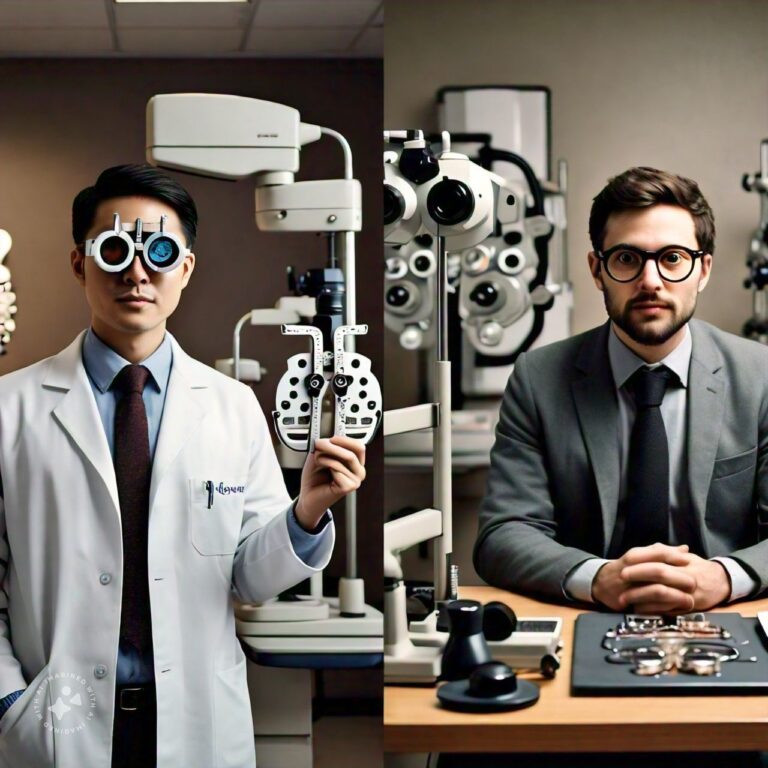
Differences Between Ophthalmology and Optometry
Ophthalmology and optometry are both professions within the eye care field, but they differ significantly in terms of training, responsibilities, and scope of practice. While both professionals are essential for maintaining and improving eye health, they approach eye care from different perspectives. Understanding the distinctions between these fields is important for those seeking proper eye care and treatment for various conditions.
Ophthalmology Overview
Ophthalmology is the branch of medicine and surgery that focuses on the diagnosis, treatment, and prevention of diseases and conditions related to the eye and visual system. Ophthalmologists are medical doctors (MDs) or doctors of osteopathic medicine (DOs) who specialize in eye and vision care. They are trained to perform eye surgeries and manage a wide range of complex eye conditions, including those that may require medical, laser, or surgical treatment.
Training and Education of Ophthalmologists:
- Education: Becoming an ophthalmologist requires extensive training. It typically begins with an undergraduate degree, followed by four years of medical school. After earning a medical degree (MD or DO), ophthalmologists must complete a one-year internship in general medicine, followed by a residency program in ophthalmology, which lasts about three years.
- Residency and Fellowship: Ophthalmologists undergo rigorous training during their residency, where they learn to diagnose and treat eye diseases and perform eye surgeries. Some ophthalmologists may pursue additional fellowship training in a subspecialty, such as pediatric ophthalmology, retinal surgery, glaucoma, corneal diseases, or neuro-ophthalmology. This can add another one to two years of specialized education.
- Scope of Practice: Ophthalmologists can diagnose and treat all eye diseases, prescribe medications, perform surgeries, and correct vision problems through various methods. Some of the common eye conditions they treat include cataracts, glaucoma, macular degeneration, diabetic retinopathy, and retinal detachments. They can perform intricate eye surgeries such as cataract removal, LASIK, corneal transplants, and retinal repairs.
- Medical and Surgical Expertise: What sets ophthalmologists apart from optometrists is their ability to perform surgeries. Ophthalmologists are highly skilled in microsurgical techniques that are used to address a wide variety of eye conditions. They also provide pre- and post-operative care for eye surgeries and work closely with other healthcare professionals to manage conditions that affect vision, such as diabetes and hypertension.
- Treatment and Prevention: Ophthalmologists focus not only on treating existing eye conditions but also on preventing them. Regular check-ups with an ophthalmologist can help detect diseases like glaucoma or macular degeneration early, which is crucial for preventing permanent vision loss. They also monitor patients with systemic conditions such as diabetes and hypertension, which can have severe effects on vision.
Common Procedures in Ophthalmology:
- Cataract Surgery: This is one of the most common surgeries performed by ophthalmologists. It involves the removal of the clouded lens of the eye and its replacement with an artificial lens.
- LASIK Surgery: LASIK (Laser-Assisted in Situ Keratomileusis) is a popular refractive surgery that corrects vision problems like nearsightedness, farsightedness, and astigmatism.
- Glaucoma Surgery: Ophthalmologists perform surgeries to reduce intraocular pressure in patients with glaucoma, a condition that can lead to vision loss if untreated.
- Retinal Surgery: These include procedures to repair retinal detachments, macular holes, or to manage complications from diabetic retinopathy.
- Corneal Transplants: When the cornea becomes damaged or diseased, an ophthalmologist can perform a corneal transplant to restore vision.
Optometry Overview
Optometry is a healthcare profession that involves examining, diagnosing, and managing visual issues and eye health. Optometrists are primary eye care providers who focus on eye exams, vision correction, and the management of certain eye diseases. They play a crucial role in ensuring overall eye health and improving vision through the prescription of eyeglasses and contact lenses.
Training and Education of Optometrists:
- Education: To become an optometrist, one must first complete an undergraduate degree, followed by four years of optometry school, where they earn a Doctor of Optometry (OD) degree. Unlike ophthalmologists, optometrists do not attend medical school and do not have the same level of surgical training.
- Licensing: After completing optometry school, optometrists must pass board exams to obtain their licenses to practice. Optometrists are licensed to provide a wide range of eye care services, but their scope of practice is regulated by state laws, which can vary.
- Scope of Practice: Optometrists are responsible for providing comprehensive eye exams, prescribing corrective lenses, and detecting eye diseases. They can also treat certain eye conditions, such as infections, inflammations, and dry eye syndrome. Optometrists are often the first point of contact for individuals experiencing vision problems or discomfort. They assess visual acuity, prescribe corrective lenses, and provide vision therapy when necessary.
- Vision Correction: One of the key roles of optometrists is the diagnosis and correction of refractive errors, such as nearsightedness (myopia), farsightedness (hyperopia), and astigmatism. They use specialized equipment to determine the appropriate prescription for eyeglasses or contact lenses. Optometrists also provide advice on maintaining eye health, such as recommending specific lens coatings for individuals with computer-related eye strain.
- Preventive Eye Care: Optometrists perform regular eye examinations, which are essential for early detection of eye diseases like glaucoma, cataracts, and macular degeneration. By identifying these issues in their early stages, optometrists can refer patients to ophthalmologists for further management, including surgery.
Common Services Provided by Optometrists:
- Comprehensive Eye Exams: Optometrists assess overall eye health and vision quality, detecting any refractive errors or signs of disease.
- Prescribing Eyeglasses and Contact Lenses: Optometrists provide prescriptions for corrective lenses and help patients choose suitable frames or contact lenses.
- Treatment of Minor Eye Conditions: They manage common eye conditions such as dry eyes, conjunctivitis (pink eye), and minor infections.
- Vision Therapy: Some optometrists specialize in vision therapy, which involves exercises designed to correct specific vision problems like lazy eye (amblyopia) or convergence insufficiency.
- Referrals to Ophthalmologists: When an optometrist detects a condition that requires medical or surgical treatment, such as cataracts or advanced glaucoma, they refer patients to an ophthalmologist.
Differences Between Ophthalmology and Optometry
- Education and Training:
- Ophthalmologists are medical doctors (MD or DO) who undergo extensive medical and surgical training, including a residency and potentially a fellowship in a subspecialty.
- Optometrists are not medical doctors but hold a Doctor of Optometry (OD) degree. Their training focuses primarily on vision care, diagnostics, and management of eye diseases, but they do not perform surgeries.
- Scope of Practice:
- Ophthalmologists can diagnose and treat all eye diseases, prescribe medications, perform surgeries, and manage systemic diseases that affect the eyes. They handle complex cases and perform intricate eye surgeries.
- Optometrists primarily provide routine eye exams, prescribe corrective lenses, and manage less severe eye conditions. They can treat minor eye diseases and provide vision therapy, but they refer surgical cases to ophthalmologists.
- Surgical Abilities:
- Ophthalmologists are trained surgeons capable of performing procedures like cataract surgery, LASIK, and glaucoma surgery.
- Optometrists are not trained to perform surgeries, although in some states they may be allowed to perform minor surgical procedures under specific regulations.
- Conditions Treated:
- Ophthalmologists treat more serious conditions such as cataracts, macular degeneration, retinal detachment, and advanced glaucoma.
- Optometrists treat conditions like dry eyes, conjunctivitis, and prescribe glasses or contact lenses for refractive errors.
- Referral Process:
- Optometrists often serve as the first point of contact for patients with vision problems and refer complex or surgical cases to ophthalmologists.
- Ophthalmologists provide comprehensive care for more advanced conditions that require medical intervention or surgery.
Conclusion
Both ophthalmology and optometry play vital roles in eye care, each bringing specialized knowledge and skills to the table. Optometrists are essential for routine eye exams, vision correction, and the early detection of eye diseases, while ophthalmologists manage more complex medical and surgical needs. Together, these professionals ensure comprehensive care for eye health, from prevention to treatment and recovery. Choosing between an optometrist and an ophthalmologist depends on the specific needs of the patient, but both are key to maintaining optimal vision and eye health throughout life.
FAQs
Related Topics
- All
- Animals
- Diseases
- Health
- Money
- Politics
© 2024 OnYelp.com. All rights reserved. Terms and Conditions | Contact Us | About us





